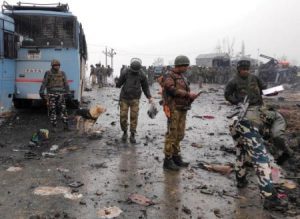New Delhi – The Financial Action Task Force (FATF) has released a comprehensive global report revealing disturbing details about how terrorist organizations are exploiting digital platforms for financing operations. The report specifically highlights that explosive for Pulwama attack materials were sourced through e-commerce platforms, marking a significant evolution in terror financing methods that poses unprecedented challenges to global security agencies.
The intergovernmental body that monitors money laundering and terror financing worldwide has raised serious concerns over the growing misuse of e-commerce platforms and online payment services by terrorist organizations. This revelation about the explosive for Pulwama attack procurement demonstrates how digital tools and financial technologies are being exploited by terrorist entities to raise, move, and manage funds in increasingly sophisticated ways.
E-commerce Platform Facilitated Terror Attack Components

The FATF report provides shocking details about how the explosive for Pulwama attack was orchestrated using modern digital infrastructure. According to the investigation findings, aluminium powder, a key component used to enhance the explosive power of improvised explosive devices (IEDs), was sourced through an e-commerce platform similar to Amazon for the devastating 2019 attack.
This discovery about the explosive for Pulwama attack procurement method has significant implications for e-commerce security protocols worldwide. The blast killed 40 CRPF personnel and was linked to Pakistan-based terror group Jaish-e-Mohammed (JeM). Investigators found that online platforms had played a crucial role in the logistics and preparation of the attack, fundamentally changing how authorities view digital commerce security.
Investigation Reveals Sophisticated Digital Terror Network


The investigation into the explosive for Pulwama attack uncovered a sophisticated network of digital transactions and online activities that enabled the terrorist operation. Nineteen people, including seven foreign nationals, were eventually charged under the Unlawful Activities (Prevention) Act, and multiple assets, including vehicles and hideouts, were recovered during the comprehensive investigation.
The case study of the explosive for Pulwama attack demonstrates how terrorists have adapted to modern digital infrastructure to execute their operations. The use of e-commerce platforms for sourcing explosive materials represents a paradigm shift in terror financing that requires immediate attention from global security agencies and digital platform operators.
Gorakhnath Temple Attack Reveals PayPal Terror Financing


The FATF report examines another detailed case study alongside the explosive for Pulwama attack investigation, focusing on the April 2022 Gorakhnath Temple attack. An ISIS-inspired individual attacked security personnel after transferring approximately Rs 6.7 lakh overseas using PayPal to support Islamic State (ISIL) operatives.
This case, examined in conjunction with the explosive for Pulwama attack findings, reveals how terrorists use multiple VPN services to mask their location and execute international transactions. The accused made 44 international transactions and payments to VPN providers from his Indian bank account, demonstrating the sophisticated nature of modern terror financing networks.
Digital Financial Services Exploitation Patterns

The rapid rise of fintech platforms over the past decade has provided terrorists with new avenues to fund operations, as evidenced by the explosive for Pulwama attack case and similar incidents. By selling small goods online, purchasing chemicals and components for explosives such as 3D-printed parts, and soliciting donations via popular social media platforms, terrorist groups are creating decentralized financial networks.
These networks, as demonstrated in the explosive for Pulwama attack investigation, are more difficult to monitor than traditional financial systems. The peer-to-peer (P2P) payments often allow the use of pseudonyms and fake accounts, posing unique challenges to authorities because they provide alternatives to traditional financial systems with reduced traceability.
State-Sponsored Terrorism Concerns


The FATF report, while analyzing cases including the explosive for Pulwama attack, warns that some national governments continue to provide direct or indirect support to terrorist organizations. While the report does not name specific countries, it states that evidence from various delegations and open-source information confirms the ongoing risk of state-sponsored terrorism.
India has long accused Pakistan of harboring and funding terrorists, particularly in relation to the explosive for Pulwama attack and similar incidents. The country has reiterated its demand that Pakistan be returned to FATF’s ‘Grey List’ in light of such findings, emphasizing the international nature of terror financing networks.
VPN Services and Digital Anonymity Challenges
The investigation into the explosive for Pulwama attack and related cases reveals how terrorists exploit VPN services and digital anonymity tools to mask their activities. PayPal suspended accounts involved in suspicious transactions, but the damage had already been done, highlighting the reactive rather than proactive nature of current security measures.
The FATF noted that this pattern reflects a growing trend among extremists to use online payment channels that are fast, affordable, and harder to trace. The case studies, including the explosive for Pulwama attack investigation, demonstrate how terrorists have adapted to use legitimate digital services for illegitimate purposes.
Recommendations for Enhanced Digital Security
The FATF report concludes with strong advisory recommendations to member nations to step up oversight of e-commerce platforms, VPN usage, and digital financial services. The findings about the explosive for Pulwama attack procurement method have influenced these recommendations, emphasizing that these systems have evolved into new-age tools for terrorists to raise funds, procure equipment, and organize attacks.
The report stresses the need for enhanced monitoring of digital transactions and improved cooperation between e-commerce platforms and security agencies to prevent future incidents similar to the explosive for Pulwama attack case.
Recent Terror Incidents and Ongoing Threats


The FATF recently condemned the April 2025 Pahalgam terror attack in Jammu and Kashmir, which killed 26 people, stating that such acts are not possible without extensive financial support and sophisticated digital infrastructure. This recent incident, analyzed alongside historical cases like the explosive for Pulwama attack, demonstrates the ongoing evolution of terror financing methods.
The comprehensive analysis of these cases, including the detailed investigation of how the explosive for Pulwama attack was facilitated through digital platforms, provides crucial insights for developing more effective counter-terrorism strategies. The report emphasizes that modern terrorism requires modern solutions, including enhanced digital surveillance and improved international cooperation in monitoring online financial transactions.
The findings regarding the explosive for Pulwama attack and similar cases serve as a wake-up call for the international community to address the growing threat of digitally-enabled terrorism through comprehensive policy reforms and enhanced security measures.

